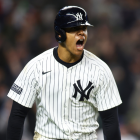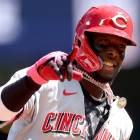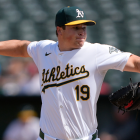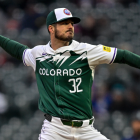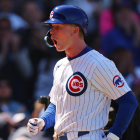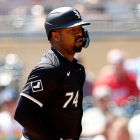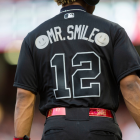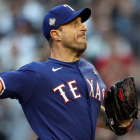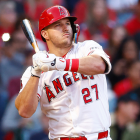The Athletics and Angels started an incredibly important four-game series on Thursday night -- Oakland came into the day one game back of the Halos in the AL West -- and the game was played under protest following a controversial obstruction call at first base in the bottom of the ninth inning.
Let's set the stage: Angels shortstop Erick Aybar led off the inning with a weak chopper along the first-base line, which was attempted to be fielded by both first baseman Brandon Moss and pitcher Dan Otero. The two collided, the ball wound up in Otero's glove, and Aybar ran into Otero. Here's the play:
Note that Aybar appeared to leave the base line to avoid both Otero and Moss. Both defenders have a right to the ball, so they weren't standing there with the intention of getting in Aybar's way. Obstruction was called on Moss -- the umpire crew clarified the call after the game -- and Athletics manager Bob Melvin officially protested following a long argument on the field.
Here is the rulebook definition of obstruction (Rule 2.00):

Clearly both Otero and Moss were not in possession of the ball but were in the act of fielding it almost right up until Aybar collided with Otero, which leads me to believe this should not be called obstruction.
Now here is the part of the rulebook that defines the base line between home plate and first base (Rule 6.05(k)):

There was no throw to first involved and Aybar did run out of the base line to avoid the fielder trying to field the ball, that being Moss. In doing so he ran right into Otero, who actually caught the ball. Boy, this is confusing.
Once play continued, the Angels eventually won the game on a walk-off sacrifice fly in the 10th inning (LAA 4, OAK 3). Since the Angels won, MLB will review the play, and they'll have to resume the game from the point of the protest if the league rules the obstruction call was incorrect. Had the A's won, they would have dropped the protest.
A little more than a week ago MLB upheld a protest by the Giants, who argued the umpiring crew did not allow enough time to pass before calling a game early due to rain. It was the first time MLB upheld a protest since 1986. The Rays protested a late manager's challenge earlier this week but the protest was denied.
This is a very complicated play and it appears Melvin has a decent case, but MLB will have the final say. My gut says that the more complicated the play, the less likely it is MLB will uphold the protest.













